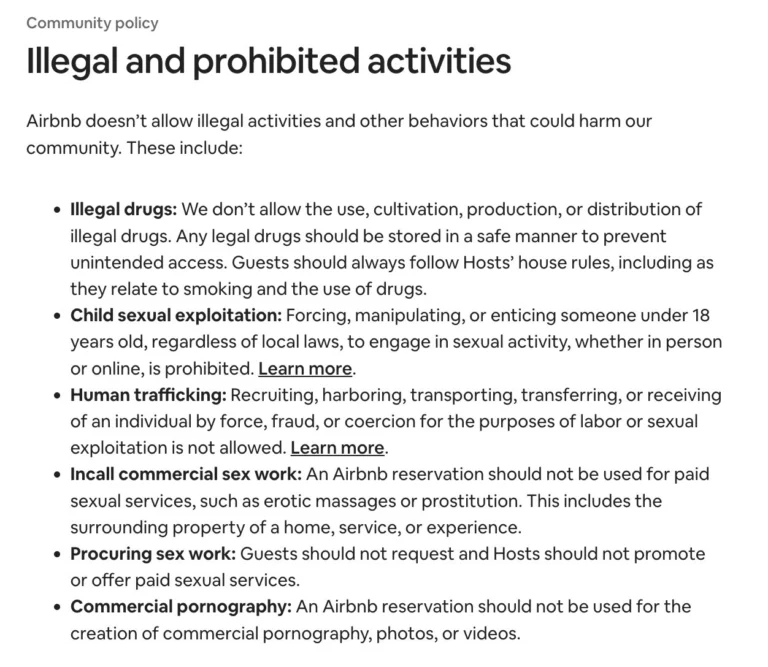Airbnb’s anti-sex work policy doesn’t just block illegal activity. It demonizes lawful pleasure, reinforces stigma, and quietly criminalizes survival. I was booking my Airbnb in Colombia—a country where sex work is legal and porn production is a rising art form—when I got slapped with a new terms and conditions page. And not just your usual “no parties, no dogs, no demonic rituals” stuff. No, this one was extra specific: No sex workers allowed. No shooting porn. No “sexual tourism.” Period.
If you’ve stayed in Airbnbs around the world, you might’ve checked that box a hundred times without seeing language like this. But something about the erotics of Latin America has Airbnb clutching its hypothetical pearls.

At first glance, it might sound like a reasonable list. Safety, consent, protection of minors—check, check, check. But buried in there, between actual crimes like human trafficking and child sexual exploitation, Airbnb quietly bans “commercial pornography,” “incall commercial sex work,” and even requesting a sex worker… in countries where it’s 100% legal. That’s not about legality. That’s about stigma.
Dear reader, let’s pull back the sheets and ask the real question: When platforms like Airbnb prohibit legal sexual labor in the name of “safety,” what are they really protecting—and who are they protecting it from?
Let me repeat this for the horny tourists in the back: Sex work is legal in Colombia. That includes in-call services, escorting, and independent porn production. It’s regulated to prevent exploitation, and many sex workers operate with government oversight, health screening, and complete autonomy.

But Airbnb doesn’t care. Their policy bans both hosting sex workers and filming legal porn inside listings. Even worse? They compare it— right there in black-and-white—to trafficking and drug crime. And then they proudly state they will support local criminal investigations, regardless of what’s legal. That’s not crime prevention. That’s platform-driven moral panic.
Fun fact: According to Amnesty International, criminalizing aspects of legal sex work increases violence against sex workers, not the other way around. When platforms refuse to provide safe, private spaces for legal transactions, they push workers into more precarious corners of the economy.
This isn’t just punitive; it’s perverse.
The word “safety” is doing a lot of suspicious heavy lifting here. Because when they say Airbnb has had “past safety incidents” with regard to sex work and porn filming, they don’t tell us any actual data. They offer no context. No acknowledgment of who was harmed, or how. Just a vague implication that sexual activity—when compensated—leads to risk.
But wait, isn’t uncompensated sexual activity still allowed? What if I’m a sugar baby who’s “visiting a friend”? What if I’m shooting amateur porn with my boyfriend, who also happens to be my OnlyFans co-star and actual romantic partner? Is a tourist allowed to pick up a local hottie and have sex, as long as there isn’t a cash app receipt? Where exactly is the line?
So again, what Airbnb seems to be enforcing here isn’t the law. It’s purity optics.
We’re living in a world where social media bans nudes that hint at nipples but pumps our feed with pumped lips and gym thirst traps. Where sex workers are prohibited from banking platforms, donation apps, and Instagram—all while being told they're “violating community guidelines.” Airbnb’s policy is just the latest addition to this soft-core dystopia, where sexual labor is systematically erased as legitimate work.
Let’s call it what it is: Digital whorephobia.
By demonizing porn and sex work—even when legal—Airbnb joins a long line of platforms (Facebook, TikTok, PayPal, take your pick) that sacrifice sex worker safety and agency to maintain corporate image or dodge hypothetical bad press. The result? Workers are pulled deeper into the shadows, denied autonomy, and further marginalized.
Fun fact: In 2018, the U.S. passed FOSTA-SESTA, two bills that claimed to curb sex trafficking—yet led to the shutting down of sites like Backpage and Craigslist personals, attacking legal sex workers while doing nothing to reduce trafficking. A Stanford study later found zero evidence that FOSTA reduced trafficking at all and actually made it harder to find and rescue victims.
Sound familiar?
Yes, Airbnb wants to protect hosts and guests. Sure, it wants to avoid criminal liability. But let’s be honest about this policy: It does not stop crime—it stigmatizes people who trade in erotic labor. It tells sex workers they can’t even exist in the space, even if their work is lawful and fully consensual. It tells content creators they can’t use their bedrooms-for-hire to make legal income. It squashes intimacy that might look transactional. And it does it all under the veil of “community values.”
Interesting that those values never seem to protect the people who fuck for a living.
So, if Airbnb’s so obsessed with safety, here’s a thought: Try working with sex workers instead of banning them. Offer “adult-friendly” filter options. Allow verified performers to rent with transparency. Build policies based on harm reduction, not knee-jerk fear.